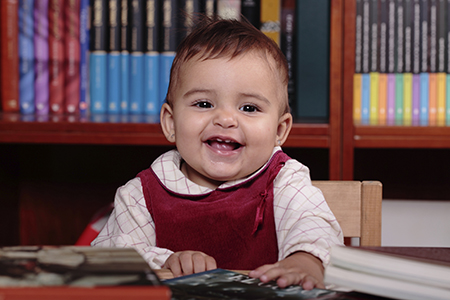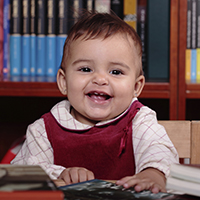 The Centre will look at why some children develop language problems, and explore why differences between children and differences in their homes and community environments have such a dramatic effect on how they learn to talk
The Centre will look at why some children develop language problems, and explore why differences between children and differences in their homes and community environments have such a dramatic effect on how they learn to talk
Experts from the Universities of Liverpool, Manchester and Lancaster have been awarded £9m to improve understanding of how babies and young children learn to talk and communicate with others.
The funding will support the Economic and Social Research Council (ESRC) International Centre for Language and Communicative Development (LuCiD) which will work with experts in the USA, Australia, Germany, Switzerland and Poland to develop interventions in child healthcare, communicative development and early years’ education.
Child Psychologist, Professor Caroline Rowland from the Institute of Psychology, Health and Society, said: “This new Centre will transform our knowledge and understanding of the way that children learn to communicate using language.
Integrate new kinds of evidence
“We will explore how children learn words and sentences from what they see and hear, and will integrate different kinds of evidence from behavioural studies, measures of brain activity and computer models to understand how children develop.”
The Centre will look at why some children develop language problems, and explore why differences between children and differences in their homes and community environments have such a dramatic effect on how they learn to talk.
Professor Elena Lieven, from the University of Manchester, said “Children’s success in early language learning is central to their school readiness and subsequent educational achievement and the Centre’s research will provide the evidence base necessary to develop successful interventions for children at risk of language delay.”
Professor Padraic Monaghan, from Lancaster University, said: “Learning to use language to communicate is hugely important for society. Failure to develop language and communication skills at the right age is a major predictor of educational and social inequality in later life.”
LuCiD will pursue five streams of research in the UK and abroad. The first four streams will focus on questions in four key areas: environment, knowledge, communication and variation.
Professor Rowland added: “The Language 0-5 Project will enable us to build a complete picture of language development from the very beginning through to school readiness using the latest technologies.
“The use of mobile phone technologies in research has greatly increased the speed with which language can be recorded and analysed and allows for a much fuller investigation of children’s language than ever before.”
The Centre will work with high profile partners from government, business, and the third sector, as well as experts in science communication and public understanding, to ensure that parents know how they can best help their children learn to talk.
Healthcare, education professionals and policy-makers will also have access to the latest findings they need to create cost-effective intervention programmes.
World class research
Funding for LuCiD, and other ESRC funded centres, was announced by the Minister for Universities and Science, David Willetts MP, who said: “Investment in these research priorities is key to driving innovation and growth, helping to influence and shape policy and deliver a better society for us all.
“The UK through its research councils, universities and institutions is well known for world class research and driving excellence. These new investments will contribute to this and ensure that the UK stays ahead in the global race.”
Wendy Lee, Professional Director of The Communication Trust, said: “I am delighted that the ESRC have invested so heavily in research on children’s language and communicative development and am looking forward to my involvement with the Centre. The research this Centre produces will provide the critical evidence-base we need to create really cost-effective interventions.”
